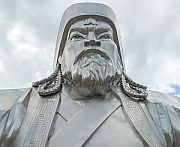- Could Your Grocery Store Meat Be Causing Recurring UTIs?
- Are You Making This Expensive Thermostat Error This Winter?
- Recognizing the Signs of Hypothyroidism
- 10 Strategies to Overcome Insomnia
- Could Artificial Sweeteners Be Aging the Brain Faster?
- Techniques for Soothing Your Nervous System
- Does the Water in Your House Smell Funny? Here’s Why
- Can a Daily Dose of Apple Cider Vinegar Actually Aid Weight Loss?
- 6 Health Beverages That Can Actually Spike Your Blood Sugar
- Treatment Options for Social Anxiety Disorder
Perhaps Genghis Khan’s Greatest Legacy: Millions of Descendants


He helped build an empire stretching across Eurasia, but Genghis Khan’s most enduring legacy may be genetic, a new study suggests.
British researchers focused on similarities in the Y chromosomes of Asian men living today. They calculated that millions of these men are descended from either the Mongolian warlord Genghis Khan — who died in 1227 A.D. — or 10 other powerful Asian leaders who ruled at various points over the past 4,000 years.
One reason for the Great Khan’s genetic success may lie in the fact that he and his Mongol tribesmen lived largely on horseback, the research team said.
The genetic lineages arising after about 300 A.D. were traced to “pastoral nomadic populations, who were highly mobile horse riders and could spread their Y chromosomes far and wide,” said project leader Mark Jobling, a professor in the department of genetics at the University of Leicester in England.
“For these lineages to become so common, their powerful founders needed to have many sons by many women, and to pass their status — as well as their Y chromosomes — on to them. The sons, in turn, could then have many sons, too. It’s a kind of trans-generation amplification effect,” he explained in a university news release.
Jobling’s team tracked the male-specific Y chromosome — which is passed from father to son — in more than 5,000 Asian men across 127 different populations.
They identified 11 Y-chromosome types that were fairly common among the men in the study. Further investigation showed that these chromosome types could be traced back to Genghis Khan and 10 other men who were dynastic leaders in Asia between 2100 B.C. and 700 A.D.
Study first author Patricia Balaresque stressed, however, that “identifying the ancestors responsible for these lineages will be difficult or impossible, as it would rely on finding their remains and extracting and analyzing ancient DNA. This hasn’t yet been done for Genghis Khan, for example, so the evidence remains circumstantial, if pretty convincing.”
The study was published recently in the European Journal of Human Genetics.
More information
The U.S. National Library of Medicine has more about the Y chromosome.
Source: HealthDay
Copyright © 2026 HealthDay. All rights reserved.










